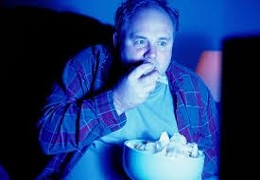Have you ever heard of other people saying that they will not eat any thing after 8 pm? They said they are on diet and eating at late night and before bed will make them gain a lot of weight. I always get hungry at night even when I ate a lot during dinner. And I can not wait until morning so I ate a lot even when it’s midnight, but I didn’t gain any weight. Do eating before really make you gain weight? or it is just a myth?
Most people who believe eating before bed will make them gain weight think that their body can’t burn those food fast enough so they will gain weight. In their mind, when they eat food during daytime, they will have plenty of time to do activities such as exercise to burn those food. But we don’t move a lot while we are sleeping, so the food will just stole in our body and become fat. This thesis seems very truth, but that is not how human body works. According to WebMD, weight gain is not based on a 24-hour clock. So you will not immateriality gain weight. the weight you gain is based on the total amount you take in over a period of time, then compare to the amount you burn in that period.
A healthy and active men should take in 2400 to 3000 calories a day, and for women, its 2000 to 2400. If your calories intake is more than that during the daytime, eating before bed will actually make you gain weight. But if you haven’t reach the point, you can eat before bed and every thing will be just normal, and it’s actually good for you. When you are building muscle you need to take in more calories. A meal before bed can help you with that if you can’t reach your calories target during the daytime. A study from Maastricht University find out that protein snacks before bed can help athletes with their muscle recovery. Healthy Eating
Although eating before bed will not make you gain weight in most situations, but we still need to stop eating about 1 hour before bed to allow digestion. Watch for your total calories intake can help you control your weight. If you have a healthy diet and enough exercise, then eating before bed will just make you stronger. Don’t be afraid to eat before bed again! US NEWS



I found your blog post to be very interesting due to the fact that I have heard about a lot of different opinions and studies related to this topic. Fred Turek, professor of neurobiology and physiology in the Weinberg College of Arts and Sciences, and director of the Center for Sleep and Circadian Biology at Northwestern University. A doctoral student on Turek’s team, Deanna M. Arble stated how the team observed that those who tend to be overweight have “schedules force them to eat at times that conflict with their natural body rhythms. This was one piece of evidence that got us thinking — eating at the wrong time of day might be contributing to weight gain”(Fellmann). The team began a six week experiment with mice, and in their trial, the control group was given access to as much “high fat food” they wanted for their 12 “wakeful” hours, but then taken away for the other 12 restful hours for the mice to complete their sleep cycle (Fellmann). The test group was allowed to have as much “high fat food” food as they desired throughout the whole 24 hour period (Fellmann). He also held the amount of exercise the mice did constant. In conclusion, Turek’s team found that the test group “gained significantly more weight (a 48 percent weight increase over their baseline), as opposed to the mice in the control group who only experienced “a 20 percent increase over their baseline” (Fellmann).
Turek’s hypothesis and understanding of why his trials generated this result was based on the idea that “our circadian clock… governs our daily cycles of feeding, activity and sleep, with respect to external dark and light cycles”(Fellmann). Meaning that, eating during the day as opposed to the night can actually affect your body. Lastly, he saw that “recent studies have found the body’s internal clock also regulates energy use, suggesting the timing of meals may matter in the balance between caloric intake and expenditure” (Fellmann).
Citation:
Fellman, Megan. “News.” Late-Night Snacks: Worse Than You Think: Northwestern University. Northwestern, 3 Sept. 2009. Web. 3 Dec. 2015. .
Although the studies you found do not conclude that eating before bed causes weight gain. Another study found that increasingly late dinners may be driving acid reflux cases which can lead to heartburn, hoarseness, chronic throat clearing, and even asthma according to an article. Some other consequences are being uncomfortable while sleeping (laying on a full stomach can be painful). Last of all, eating late at night can throw off one’s internal clock.
This is actually something I think about quite often. I always wondered if eating before bed actually would make me gain weight. I have now concluded from your studies that it does not, but I still think it is not good for you to eat before bed. I have heard eating a heavy meal before going to bed can cause insomnia. I decided to check it out, and an article through Mayo Clinic actually says how eating a lot before bed can cause someone to feel physically uncomfortable or maybe some heartburn. These could both make it harder for someone to fall asleep.
Funny you should mention this topic because my family was having this discussion over thanksgiving dinner. My uncle thought we should eat early so we can burn the calories before we go to sleep and we all thought it was fine. Anyway, i believe that your blog could use a study to make it more scientific and i found this study to add more information http://www.livescience.com/35386-sleep-weight-loss-calories-linked-101114.html. After reading your blog it made me wonder, do you burn less calories while talking a nap? Or only sleep at night?
I think that when a study is conducted it should be randomized so that we are seeing a result for different types of people rather then just adult males for intense.